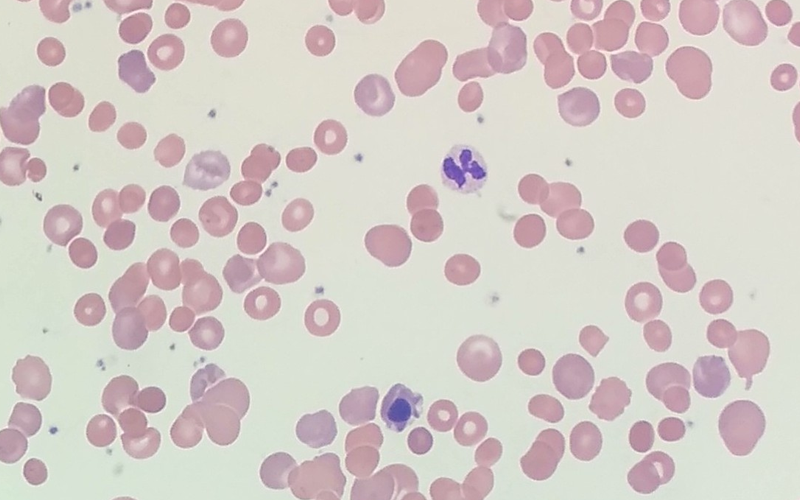Autoimmune Hemolytic Anemia
Autoimmune hemolytic anemia, or AIHA, is a rare type of anemia. When you have anemia, your bone marrow doesn't make enough red blood cells. Or these cells don't work as well as they should.
Red blood cells carry oxygen to your body. When you have too few red blood cells, your body can't get enough oxygen, leaving you feeling tired or short of breath.
What is AIHA?
Red blood cells are made in the spongy material called bone marrow deep inside your bones. These blood cells normally live for about 120 days.
If you have autoimmune hemolytic anemia, your body’s immune system attacks and destroys red blood cells faster than your bone marrow can make new ones. Sometimes these red blood cells live for only a few days.
Most people who get AIHA are middle-aged or older. It’s rare in children, and it usually shows up soon after a viral illness and goes away on its own. If your teenager gets it, it could be a sign they have some other health problem.

Types of AIHA
Autoimmune hemolytic anemia is classified in a few different ways:
- Primary AIHA: Appears by itself
- Secondary AIHA: Affects you because you have another illness.
The disease is also classified by the temperature at which red blood cells are damaged:
Warm antibody hemolytic anemia: The immune reaction takes place at or above normal body temperature.
Cold antibody hemolytic anemia: Red blood cells are destroyed when you’re exposed to cold.
Autoimmune Hemolytic Anemia Signs and Symptoms
Many of the symptoms of AIHA are the same as those of other forms of anemia. You may have:
- Chills
- Fast heartbeat, known as tachycardia
- Pale skin that may start to yellow
- Shortness of breath
- Weakness and fatigue
- Chest pain
- Yellow skin or whites of the eyes (jaundice)
- Dark urine
- A feeling of abdominal fullness related to an enlarged spleen
Some symptoms are different depending on which type of AIHA you have. With cold antibody hemolytic anemia, you may also notice:
- Cold hands and feet
- Bluish or reddish color in hands and feet
- Headache
- Digestive problems
- Pain in the back and legs
AIHA Causes
You can get autoimmune hemolytic anemia if you have an autoimmune disease like lupus. Normally when your immune system spots foreign invaders like bacteria and viruses, it makes proteins called antibodies to attack them. When you have AIHA, your immune system makes antibodies that mistakenly attack your own red blood cells.
Other diseases and medications can also cause autoimmune hemolytic anemia. Some of these are:
- Cancers, including chronic lymphocytic leukemia and non-Hodgkin's lymphoma
- Infections like Mycoplasma pneumoniae
- Medicines such as penicillin, methyldopa (Aldomet), quinine (Qualaquin), and sulfonamides
- Viruses such as Epstein-Barr virus, cytomegalovirus, HIV, and hepatitis
AIHA Diagnosis
If you think you could have any type of anemia, you should talk to your doctor. They may refer you to a hematologist, a doctor who specializes in blood diseases. They’ll most likely discuss your past medical history, medications you take, and talk about your symptoms.
They’ll also request a blood test called a complete blood count, or CBC, to look for signs of anemia. This test measures:
- The number of red blood cells, white blood cells, and platelets
- The size of your red blood cells
- The protein in your red blood cells that carries oxygen (hemoglobin)
- How much space red blood cells take up in your blood (hematocrit)
A low red blood cell count and low hemoglobin and hematocrit levels are signs of anemia.
If your CBC test results point to anemia, the doctor might want to do more tests. You might get one of these:
- Reticulocyte count. This measures the number of young red blood cells in your body. A high reticulocyte count means your bone marrow is making a lot more cells to replace the ones your body has destroyed.
- Coombs' test. The doctor will do this test to see if your body is making antibodies against red blood cells.
- Peripheral smear. Your doctor will check your red blood cells under a microscope for signs of blood cell destruction.
- Bilirubin test. Levels of this substance rise when blood cells are destroyed.
- Haptoglobin test. This protein clears debris from damaged red cells out of the bloodstream. Levels will be low when it’s being used heavily.
- Cold agglutinin titer. The doctor may test your level of these antibodies that attack red blood cells at cold temperatures.
Autoimmune Hemolytic Anemia Treatment
If you have a disease like lupus that’s causing your anemia, your doctor will treat it first. If a medication is the cause, you'll likely have to stop taking that medicine. If your AIHA is mild, you may not need treatment.
Doctors usually first prescribe steroids, such as hydrocortisone or prednisone, to stop your immune system from attacking your red blood cells. A medicine called rituximab may make steroids work even better.
If you don’t improve, you may need surgery to remove your spleen. That’s where much of the destruction of red blood cells takes place.
Other medicines such as azathioprine (Imuran) and cyclophosphamide (Cytoxan) can be used to suppress the immune system.
You may need a blood transfusion.
If you Have Any Queries, Call Us On
+91-8193809030
